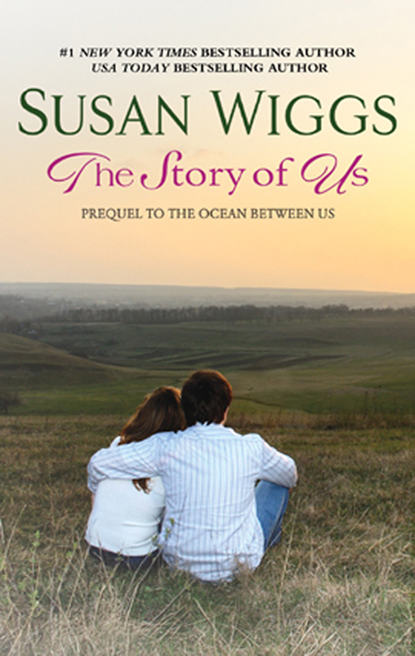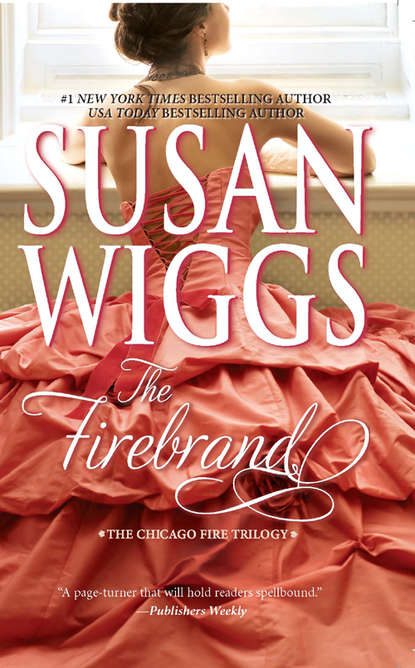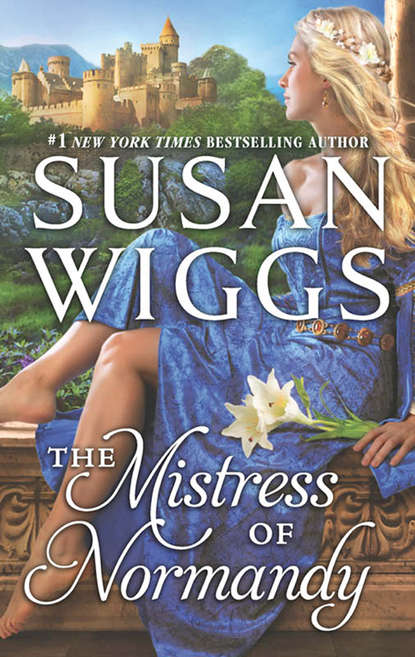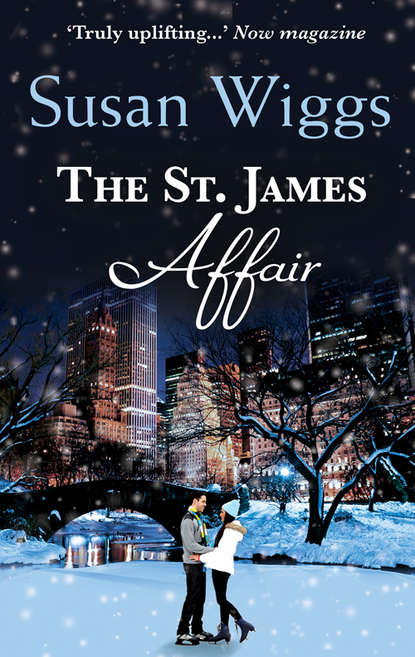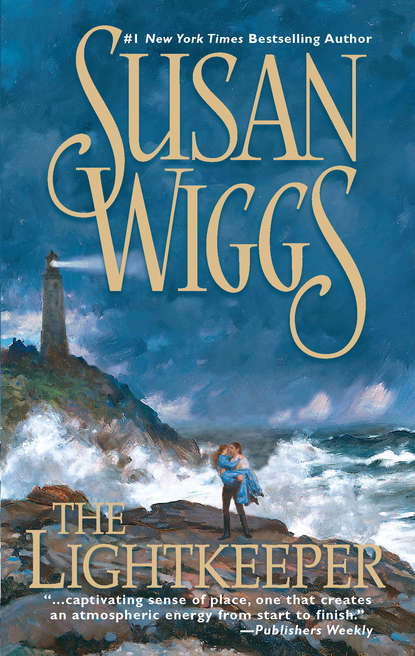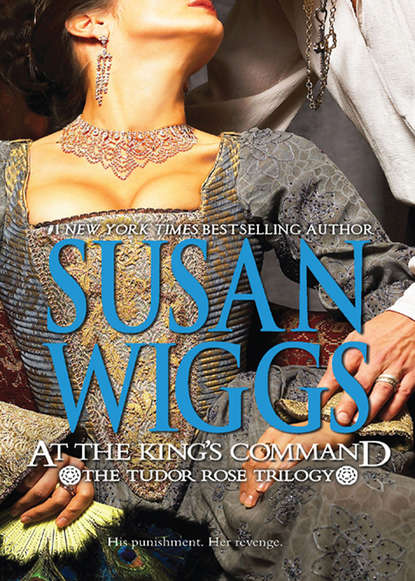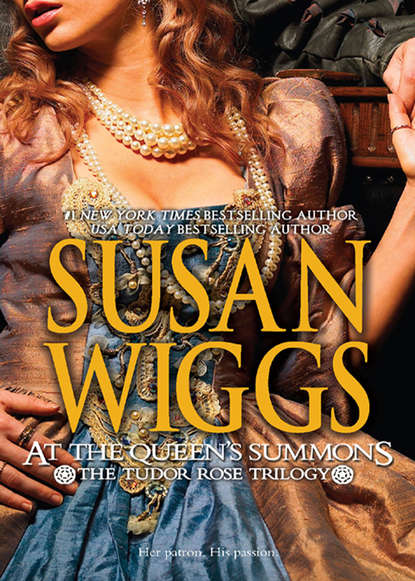
Полная версия
The Hostage

Praise for the novels of Susan Wiggs
“Susan Wiggs paints the details of human relationships with the finesse of a master.”
—Jodi Picoult, New York Times bestselling author
“Once more, Ms. Wiggs demonstrates her ability to bring readers a story to savor that has them impatiently awaiting each new novel.”
—RT Book Reviews on The Hostage
“A thrilling blend of adventure and romance…Wiggs provides a delicious story for us to savor.”
—Oakland Press on The Mistress
“Susan Wiggs delves deeply into her characters’ hearts and motivations to touch our own.”
—RT Book Reviews on The Mistress
“A quiet page-turner that will hold readers spellbound as the relationships, characters and story unfold. Fans of historical romances will naturally flock to this skillfully executed trilogy, and general women’s fiction readers should find this story enchanting as well.”
—Publishers Weekly on The Firebrand
“Wiggs is one of our best observers of stories of the heart. Maybe that is because she knows how to capture emotion on virtually every page of every book.”
—Salem Statesman-Journal
“Susan Wiggs writes with bright assurance, humor and compassion.”
—Luanne Rice, New York Times bestselling author
The Hostage
Susan Wiggs
The Chicago Fire Trilogy

www.mirabooks.co.uk
Also by Susan Wiggs
Contemporary Romances
HOME BEFORE DARK
THE OCEAN BETWEEN US
SUMMER BY THE SEA
TABLE FOR FIVE
LAKESIDE COTTAGE
JUST BREATHE
The Lakeshore Chronicles
SUMMER AT WILLOW LAKE
THE WINTER LODGE
DOCKSIDE
SNOWFALL AT WILLOW LAKE
FIRESIDE
LAKESHORE CHRISTMAS
THE SUMMER HIDEAWAY
Historical Romances
THE LIGHTKEEPER
THE DRIFTER
The Tudor Rose Trilogy
AT THE KING’S COMMAND
THE MAIDEN’S HAND
AT THE QUEEN’S SUMMONS
Chicago Fire Trilogy
THE HOSTAGE
THE MISTRESS
THE FIREBRAND
Calhoun Chronicles
THE CHARM SCHOOL
THE HORSEMASTER’S DAUGHTER
HALFWAY TO HEAVEN
ENCHANTED AFTERNOON
A SUMMER AFFAIR
For Lisa and Bruce, with love
Part One
And the wind raging, and the fire burning, and London and Paris and Portland outdone, and no Milton and no Dante on earth to put the words together.
—Chicago Tribune
(burned before distribution)
Prologue
Chicago
8 October 1871
It was the hottest October anyone could remember. Less than an inch of rain had fallen in three months. Livestock died of thirst, their bloated carcasses splayed beside sunbaked mudholes. The unseasonable warmth made women regard baking day with special loathing and small children cranky with prickly heat. Laboring men paused in their work, looked up at the sky and remarked to each other that they’d surely welcome a breath of winter.
Drought and dry windstorms kept the fire companies frantically busy; engineers and pipemen were called on to put out as many as six fires a day, battling the flames that fed on unpainted frame cottages, rickety shanties with roofs of tar and shake, and the endless supply of woodchips from Chicago’s lumber mills.
Into the restless stream of hot prairie wind floated a single spark.
Later, some would say the spark came from a stove chimney. Many believed the gossip that the unfortunate placement of a lantern near a cow in Mrs. O’Leary’s barn had caused the mayhem. Others would swear, in the terrible aftermath, that the hand of God himself started it all, while still others accused the Devil. Some even blamed a hail of comets that rained from the night sky. In the great charred ruin of the city, fingers would point and recriminations would echo across courtrooms, in the city hall and at hearings before the Board of Fire.
But the fact was, a single spark, dipping and swirling like a drunken ballerina, rode an updraft of wind that night. It sailed high over a neighborhood of wood frame houses, barns packed with timothy hay, sheds full of coal and wood shavings for tinder, sidewalks constructed of knotty spruce and pine-block roadways.
The West Division neighborhood was a rabbit warren of narrow, miserable alleys and makeshift shanties, a place no respectable person would ever visit. But it was home to day laborers and women with too many babies, to shopkeepers and immigrants, to drunks and dreamers, loose women and strict Catholics. And in the tacked-together neighborhood they bore their children, worshiped, ate, drank, fought, loved and buried their dead.
The dry, blowing heat prompted some folks to find their beds early, while others tried to drown their discomfort in drink and song. The thin, lively whine of fiddle music and the thump of hobnail boots on plank floors emanated from some of the cottages. Noise flooded through open windows and caused flimsy walls to reverberate with the hectic celebration.
And high in the wild night sky, the spark looped and changed direction, pushed along by the wind blowing in from the broad and empty Illinois prairie.
The spark entered a barn where five milk cows and a horse stood tethered with their heads lowered, and a calf lay curled on a bed of straw.
The tiny ember dropped onto a store of musty hay, and when the wind breathed on it, a small circle of orange appeared.
No one saw the pool of flame spread like spilled water, dripping down and over the stacked hay, igniting the crisp, dry wood shavings from Bateham’s Planing Mill. No one saw the river of fire flowing along the worn plank floor. No one noticed the horse’s nostrils dilate in fear or heard the animal emit a high-pitched whistle of alarm.
Finally, a drayman with a wooden leg, who happened to be loitering across the street, noticed the deep-toned, unnatural light and headed clumsily for the barn. The cows, tied by their halters, stood unmoving even when Pegleg Sullivan came crashing into the barn and untied them. The calf, with its hide on fire and its tether hanging in the wood shavings, plowed into Pegleg and half dragged him out into the yard.
Tall, graceful fronds of flame bloomed at the side of the barn. Stark orange light licked across the beaten earth of the yard between house and shed.
Finally, a man’s voice broke the night. “Kate, the barn’s afire!”
In Box Number 342, at the corner of Canalport Avenue and Halsted Street, the first alarm sounded.
And over the sleeping faces of the children in the West Division of Chicago, a strange and rusty glow of light flickered.
Chapter One
“What’s the matter with Deborah?” asked Phoebe Palmer, standing in the middle of a cluttered suite of rooms at Miss Emma Wade Boylan’s School for Young Ladies. Lacy petticoats and beribboned unmentionables littered the divans and ottomans of the fringed, beaded and brocaded salon. “She won’t even let her maid in to attend her,” Phoebe added.
“I’ll see what’s keeping her.” Lucy Hathaway pushed open the door to an adjoining chamber. Deborah’s dress, which she had worn to Aiken’s Opera House the previous night, lay slumped in a heap of tulle and silk on the floor. A mound of sheets lay scattered over the bed, while the smell of expensive perfume and despair hung in the air.
“Deborah, are you all right?” Lucy asked softly. She went to the window, parting the curtain to let in a bit of the waning evening light. In the distance, some of the taller buildings and steeples of distant Chicago stabbed the horizon. The sky was tinged dirty amber by the smoke and soot of industry. But closer to Amberley Grove, the genteel suburb where the school was located, the windswept evening promised to be a lovely one.
“Deborah, we’ve been pestering you for hours to get ready. Aren’t you coming with us tonight?” Lucy persisted. Though the engagement bore the humble name of an evangelical reading, everyone knew it was simply an excuse for the cream of society to get together on the Sabbath. Though weighty spiritual issues might be discussed, lighter matters such as gossip and romance would be attended to with appropriate religious fervor. Tonight’s particular social event had an added drama that had set tongues to wagging all week long. The intensely desired Dylan Kennedy was looking for a wife.
“Please, dear,” Lucy said. “You’re scaring me, and ordinarily nothing scares me.”
Huddled on the bed, Deborah couldn’t find the words to allay her friend’s concern. She was trying to remember what her life had been like just twenty-four hours ago. She was trying to recall just who she was, tallying up the pieces of herself like items in a ledger book. A cherished only daughter. Fiancée of the most eligible man in Chicago. A privileged young woman poised on the threshold of a charmed life.
Everything had fallen apart last night, and she had no idea how to put it all back together.
“Make her hurry, do,” Phoebe said, waltzing in from the next room with a polished silk evening dress pressed to her front. “Miss Boylan’s coach will call for us in half an hour. Imagine! Dylan Kennedy is finally going to settle on a wife.” She preened in front of a freestanding cheval glass, patting her glossy brown hair. “Isn’t that deliciously romantic?”
“It’s positively barbaric,” said Lucy. “Why should we be paraded in front of men like horses at auction?”
“Because,” Kathleen O’Leary said, joining them in Deborah’s chamber, “Miss Boylan promised you would all be there. Three perfect young ladies,” she added with a touch of Irish irony. She reached for the curtain that shrouded the bed. “Are you all right, then, miss?” she asked. “I’ve been trying like the very devil to attend to you all day.” The maid put out a pale, nervous hand and patted the miserable mound of blankets.
Deborah felt assaulted by her well-meaning friends. She wanted to yell at them, tell them to leave her alone, but she had no idea how to assert her own wishes. No one had ever taught her to behave in such a fashion; it was considered unladylike in the extreme. She shrank back into the covers and pretended not to hear.
“She doesn’t answer,” Lucy said, her voice rising with worry.
“Please, Deborah,” Phoebe said. “Talk to us. Are you ill?”
Deborah knew she would have no peace until she surrendered. With slow, painstaking movements, she made herself sit up, leaning against a bank of Belgian linen pillows. Three faces, as familiar as they were dear to her, peered into hers. They looked uncommonly beautiful, perhaps because they were all so different. Blackhaired Lucy, carrot-topped Kathleen and Phoebe with her light brown curls. Their faces held the winsome innocence and anticipation Deborah herself had felt only yesterday.
“I’m not ill,” she said softly, in a voice that barely sounded like her own.
“You look like hell,” Lucy said with her customary bluntness.
Because I have been there.
“I’ll send for the doctor.” Kathleen started toward the door.
“No!” Deborah’s sharp voice stopped the maid in her tracks. A doctor was unthinkable. “That is,” she forced herself to say, “I assure you, I am not in the least bit ill.” To prove her point, she forced herself out of bed and stood barefoot in the middle of the room.
“Well, that’s a relief.” With brisk bossiness, Phoebe took her hand and gave it a friendly, aggressive tug. Deborah stumbled along behind her and stepped into the brightly lit salon.
“I imagine you’re simply overcome because you’ll be a married woman a fortnight from now.” Phoebe dropped her hand and smiled dreamily. “You are so fabulously lucky. How can you keep to your bed at such a magical time? If I were engaged to the likes of Philip Ascot, I should be pacing the carpets with excitement. The week before my sister married Mr. Vanderbilt, my mother used to joke that she needed an anchor to keep her feet on the ground.”
Deborah knew Phoebe didn’t mean for the words to hurt. Deborah was a motherless daughter, the saddest sort of creature on earth, and at a time like this the sense of loss gaped like an unhealed wound. She wondered what a young woman with a mother would do in this situation.
“So,” Lucy said, “let’s hurry along. We don’t want to be late.”
Through a fog of indifference, Deborah surveyed the suite cluttered with combs, atomizers, lacy underclothes, ribbons, masses of petticoats—a veritable explosion of femininity. It was the sort of scene that used to delight her, but everything was different now. Suddenly these things meant nothing to her. She had the strangest notion of being encased in ice, watching her friends through a wavy, frozen wall. The sense of detachment and distance hardened with each passing moment. She used to be one of the young ladies of Miss Boylan’s famous finishing school, merry and certain of her place in the glittering world of Chicago’s debutantes. It all seemed so artificial now, so pointless. She felt alienated from her friends and from the contented, foolish girl she used to be.
“And what about you, dear Kathleen?” Phoebe asked, aiming a pointed glance at the red-haired maid. Phoebe took every chance to remind Kathleen that she was merely the hired help, there at the sufferance of more privileged young women like herself. “What do you plan to do tonight?”
Kathleen O’Leary’s face turned crimson. She had the pale almost translucent skin of her Irish heritage, and it betrayed every emotion. “You’ve left me a fine mess to be tidying up, miss. And won’t that keep me busy ‘til cock-crow.” Saucy as ever, she exaggerated her brogue on purpose.
“You should come with us, Kathleen.” Lucy, whose family had raised her to be a free thinker, didn’t care a fig for social posturing, but she knew that important people would be attending. The politicians, industrialists and social reformers were valuable contacts for her cause—rights for women.
“Really, Lucy,” scolded Phoebe. “Only the best people in town are invited. Dr. Moody’s readings are strictly for—”
“The invitation was extended to every young lady at Miss Boylan’s,” Lucy, who was both wealthy and naive enough to be an egalitarian, reminded her.
“Stuff and nonsense,” Kathleen said, her blush deepening.
“Perhaps you should attend,” Phoebe said, a calculating gleam in her eye. “It might be fun to surprise everyone with a lady of mystery.”
The old Deborah would have joined in the ruse with pleasure. Lively, intelligent Kathleen always added a sense of fun to the sometimes tedious routine of social climbing. But it was all too much to think about now, and she passed a shaking hand over her forehead. The celluloid hairpins she hadn’t bothered to remove last night exaggerated the headache that made her grit her teeth. The pain hammered so hard at her temples that the pins seemed to pulse with a life of their own.
“Phoebe’s right, Kathleen,” Lucy was saying. “It’ll be such fun. Please come.”
“I’ve not a stitch to wear that wouldn’t mark me as an imposter,” Kathleen said, but the protest failed to mask the yearning in her voice. She had always harbored an endless fascination with high society.
“Yes, you have.” Deborah forced herself out of her torpor. “You shall wear my new dress. I won’t be needing it.”
“Your Worth gown?” Phoebe demanded. At her father’s insistence, Deborah’s gowns all came from the Salon de Lumière in Paris. “For mercy’s sake, you’ve never even worn it yourself.”
“I’m not going.” Deborah kept her voice as calm as she could even though she felt like screaming. “I must go into the city to see my father.” She wasn’t sure when she had made the decision, but there it was. She had a matter of utmost importance to discuss with him, and she could not put it off any longer.
“You can’t go into the city tonight,” Phoebe said. “Don’t be silly. Who would chaperone you?”
“Just come with us,” Lucy said, her voice gentle. “Come to the reading, and we’ll take you to see your father afterward. Philip Ascot will be in attendance, won’t he? He’ll be expecting you. What on earth shall we tell him?”
The name of her fiancé rushed over Deborah like a chill wind. “I’ll send my regrets.”
“You aren’t yourself at all.” Lucy touched her arm, her light brush of concern almost powerful enough to shatter Deborah. “We shall go mad with worry if you don’t tell us what’s wrong.”
Phoebe stuck out her foot so Kathleen could button her kid leather boot. “Was it last night’s opera? You were fine when you left, but you stayed in bed all day long. Didn’t you like Don Giovanni?”
Deborah turned away, a wave of nausea rolling over her. The notes of the Mozart masterpiece were forever burned into her.
“It’s your bloody flux, isn’t it?” Kathleen whispered, ignoring Phoebe’s boot. “You’ve always suffered with the heavy pains. Let me stay behind and fix you a posset.”
“It’s not the flux,” Deborah said.
Lucy planted her palm flat against the door. “This isn’t like you. If something’s wrong, you should tell us, dear.”
Nothing’s wrong. She tried to eke out the words, but they wouldn’t come, because they were a lie. Everything was wrong and nothing could ever be the same. But how did she explain that, even to her best friends?
“It’s of a private nature,” she said faintly. “Please. I’ll explain it all when I return.”
“Oh, so you’re going to be mysterious, are you?” Phoebe sputtered. “You’re just trying to make yourself the center of attention, if you ask me.”
“No one asked you,” Lucy said wearily.
Phoebe sputtered some more, but no one was listening. Though she had come up through school with the rest of them, Phoebe had set herself apart from the others. Nearly as rich as Deborah and nearly as blue-blooded as Lucy, she had concluded that the two “nearlys” added up to much loftier status than her friends enjoyed. She was a terrible and unrepentant snob, generally benign, though her remarks to Kathleen O’Leary sometimes brandished the sharp edge of malice. Phoebe alone understood that one did not simply abandon an exclusive social event. But this merely proved the inferiority of a girl like Deborah Sinclair. New-money people simply didn’t understand the importance of attending the right sort of functions with the right sort of people.
“I’d best go ring for my driver,” Deborah said.
Lucy moved away from the door. “It won’t be the same without you.”
Deborah bit her lip, afraid that the sympathy from her best friend would break through the icy barrier she had painstakingly erected between control and madness. “Help Kathleen with the gown,” she said, hoping to divert everyone’s attention to the masquerade.
After sending for her coach, Deborah buttoned on a simple blue serge dress and tugged a shawl around her shoulders. Pushing her feet into Italian kid leather boots, she didn’t bother with the buttoning. Instead, she wound the ribbons haphazardly around her ankles and then jammed on a hat.
In the main salon, the others dressed more carefully. Eyes shining with forbidden pleasure, Kathleen stepped into the French gown, her homespun bloomers disappearing beneath layers of fancy petticoats. The gown of emerald silk and her Irish coloring gave her the look of a Celtic princess, and her face glowed with an excitement Deborah could no longer share.
Before leaving, Deborah stepped back and surveyed the scene, seeing it for the first time through the eyes of an outsider. Over her father’s protests she had left his opulent, gilded mansion for the solid gothic halls of Miss Boylan’s. Her father believed the very best young ladies were educated at home. But once he learned a Hathaway and a Palmer would be in attendance, he had relented and allowed Deborah to complete her education with finishing school. She looked with fondness upon Lucy, Kathleen and Phoebe, who were her closest companions and sometimes, she thought, her only friends. The four of them had shared everything—their hopes and dreams, their broken hearts and romantic triumphs.
Finally Deborah had encountered something she could not share with her friends. She could not. It was too devastating. Besides, she must tell her father. She must. Please God, she prayed silently. Let him understand. Just this once.
“Have a wonderful time this evening,” she said, her hand on the door handle. “I shall want to hear all about Kathleen’s debut when I return.” She forced the words past a throat gone suddenly tight with terror.
Kathleen rushed to the door. “Miss Deborah, are you certain that—”
“Absolutely.” The word was a mere gust of air.
“Let the poor thing go,” Phoebe said in a distracted voice. She lifted her arm with the sinuous grace of a ballerina and drew on a silken glove. “If you stand around arguing all evening, we’ll be late.”
She and Lucy launched into a squabble over how Kathleen should wear her hair, and Deborah took the opportunity to slip out into the tall, cavernous hall and down to the foyer, where her driver waited. Outside, she saw the school’s large, cumbersome rockaway carriage being hitched to four muscular horses. The school crest adorned the black enamel doors.
Deborah’s private Bismarck-brown clarence, with its gleaming glass panes front and rear, waited at the curb. Thanks to her father’s habit of flaunting his wealth, the expensive vehicle, with its experienced driver and Spanish coach horse, was always at her disposal. Within a few minutes, she was under way.
She gripped a leather strap at the side of the interior of the coach, bracing herself against the rocking motion. As they pulled away from the school, with its ponderous, pretentious turrets and wrought iron gates, she felt like Rapunzel escaping her tower prison. Small farms sped past, squat houses hugged low against the prairie landscape of withered orchards and wind-torn cornfields. Lights glimmered in windows and the sight of them pierced her. She pictured the families within, gathering around the table for supper. She had only seen such families from afar, but imagined they shared an easy intimate warmth she had never felt growing up in the cold formality of her father’s house.
She cast away the yearning. All her life she had enjoyed the advantages most women never dared to dream about. Arthur Sinclair had crafted and aligned his daughter’s future with the same precise attention to detail with which he put together his business transactions. His rivals vilified him for his aggression and ambition, but Deborah knew little of commerce. Her father preferred it that way.
The drive into Chicago was swift. Jeremy, who had served as her personal driver since she was three years old, drove expertly through the long, straight roads that crisscrossed the city. Jeremy lived in a garden cottage along the north branch of the Chicago River. He had a plump wife and a grown daughter who had recently wed. Deborah wondered what Jeremy did when he returned home to them, late at night. Did he touch his sleeping wife or just light a lamp and look at her for a moment? Did she awaken, or sigh in her sleep and turn toward the wall?
Deborah knew she was using her meandering thoughts to keep her mind off the ordeal to come. She shifted restlessly on the seat and cupped her hands around her eyes to see through the glass as Chicago came into view. Ordinarily, the air was cool closer to the lake, but this evening, the day’s heat hung well past sundown.




